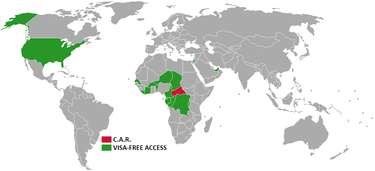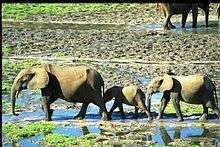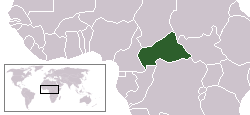Central African Republic
The Central African Republic (French: République centrafricaine or Centrafrique, Sangho: Ködörösêse tî Bêafrîka) is at the geographic center of Africa, bordered by Cameroon to the west, Chad to the north, Sudan and South Sudan to the east, and the Democratic Republic of the Congo and Republic of the Congo to the south.
| WARNING: The Central African Republic has long had one of the least effective central governments on the continent. Murder, robbery, and kidnapping are serious risks, including in the capital. Large areas of the country are controlled by armed groups who regularly kidnap, injure, or kill civilians. In the event of unrest, airport, land border, and road closures may occur with little or no notice. Foreign governments have limited ability to provide emergency services to their citizens. Many Western governments advise their citizens against any travel to the CAR. | |
Government travel advisories
| |
| (Information last updated Aug 2018) |
Cities
Other destinations
- 🌍 Dzanga-Sangha National Park – the country's one national park that still attracts adventurous tourists
- 🌍 Manovo-Gounda St. Floris National Park
- Pygmy settlements in the rainforests surrounding Mbaiki.
Understand
History
Until the early 1800s, the peoples of Central Africa lived beyond the expanding Islamic frontier in the Sudanic zone of Africa and thus had relatively little contact with outsiders. During the first decades of the 19th century, however, Muslim traders increasingly began to penetrate this region and to cultivate special relations with local leaders to facilitate their trade and settlement in the region. The initial arrival of Muslim traders in the early 1800s was relatively peaceful and depended upon the support of local peoples, but after about 1850, slave traders with well-armed soldiers began to penetrate the region.
European penetration of Central African territory began in the late 19th century during the so-called Scramble for Africa. The French, Belgian and British competed to establish their claims to territory in the Central African region.
In 1889 the French established a post on the Ubangi River at Bangui, the future capital of and the CAR and in 1894, the "French Congo's" borders with (Belgian) Congo Free State, now the Democratic Republic of the Congo and (German) Cameroon were fixed by diplomatic agreements. The French named their colony Ubang Shari.
On 1 December 1958 the colony of Ubangi-Shari became an autonomous territory and took the name Central African Republic. The founding father, Barthélémy Boganda, died in a mysterious plane accident in 1959, just eight days before the last elections of the colonial era. On 13 August 1960 the Central African Republic gained its independence and two of Boganda's closest aides became involved in a power struggle. David Dacko won and by 1962 had established a one-party state.
Since then a series of coups, including a notorious period under a self-declared emperor, Jean-Bedel Bokassa, and periodic violence from rebel groups, have dealt a very bad lot to the citizens of the Central African Republic. Today, this remains one of the most lawless, dangerous and unstable nations on earth, and is the world's poorest country as of 2019. The northeast of the country is the heart of the rebel movement and the CAR's most dangerous region.
Climate
The climate is generally tropical. The northern areas are subject to harmattan winds, which are hot, dry, and carry dust. The northern regions have been subject to desertification, and the northeast is a Sahel desert akin to neighboring Darfur. The remainder of the country is prone to flooding from nearby rivers.
In the November 2008 issue of National Geographic magazine, the Central African Republic was named the country least affected by light pollution.
People
Central African Republic consists of 80 ethnic groups, each having their own language, including the Gbaya, Banda, Mandija, Sara, Mboum, M'baka and Yakoma.
Get in

Entry requirements
Citizens of the following 16 countries can visit Central African Republic without a visa for up to 90 days: Benin, Burkina Faso, Burundi, Cameroon, Chad, Republic of the Congo, Democratic Republic of the Congo, Côte d'Ivoire, Equatorial Guinea, Gabon, Israel, Liberia, Niger, Rwanda, Senegal, United States (up to 180 days).
Visas can be single entry or multiple entry, but multiple entry is recommended more than single entry. Multiple entry visas usually last a year, whereas the single entry last three months. They cost US$150 and take two days to process. If you are from a country without a CAR embassy (such as New Zealand), you may apply for a CAR visa at a French consulate/embassy. It is unclear if other nationals (citizens of the USA, France, etc.) may apply at a French consulate or not. Policies for obtaining a visa vary among CAR embassies and from month-to-month. You may apply for a CAR visa at CAR embassies in neighboring Yaounde, N'Djamena, Brazzaville, Kinshasa, & Khartoum. The CAR also has embassies in Washington, Paris, & Bonn.
Borders with Chad, Sudan, South Sudan, and the Democratic Republic of the Congo (at least east of Bangui) are very insecure and any attempt to travel across them by land is not recommended. There is no land routes between the CAR and Congo-Brazzaville (Republic of the Congo).
By plane
The country's only international airport (and only airport with scheduled flights) is Bangui M'Poko International Airport (BGF IATA). There is no Central African airline to provide regional connections or transfers to domestic flights. Air France provides the only service to Europe, flying to Paris. Ethiopian Airlines flies to Addis Ababa. Kenya Airways serves Bangui on its three-city route Nairobi-Bangui-Douala. Royal Air Maroc flies the three-city route Casablanca-Douala-Bangui. TAAG Angola Airlines flies two three-city routes connecting Luanda-Brazzaville-Bangui and Luanda-Douala-Bangui.
Other airlines serving Bangui include: Camairco & Interair South Africa (both to Douala) and Toumai Air Chad (to Brazzaville, Cotonou, Douala, Libreville, Lomé, & N'Djamena).
By bus
Bus service is available from Cameroon and Chad, although the length and the dangerous countryside makes such bus trips infrequent. In terms of safety and ease of passing through checkpoints, however, traveling by bus is preferable to traveling by 4x4.
By boat
.jpg)
Other African cities and countries are accessible via boats and barges that travel infrequently along the Ubangui river. The Ubangui River flows into the Congo River, which is navigable all the way to Stanley Falls near Kinshasa/Brazzaville. Although slow, there are regular (although adhering to no set schedule) barges which travel from Bangui to Kinshasa/Brazzaville.
Boats also traverse the Bangui river from Bangui to Zongo, DRC, which is connected to the DRC's limited & rough road network, continuing onward to Uganda, Rwanda, and Burundi.
By 4x4
The Central African Republic is one of the least developed countries in Africa and its road network is in poor condition and services are almost non-existent away from the larges cities/towns. The police/military are extremely corrupt and checkpoints (set up for bribes more than any other reason) are frequent. There are no roads through the dense jungle between the CAR & Congo-Brazzaville. Travel from Cameroon to Bangui and onwards to Dzanga-Sangha Reserve is relatively easy, but bribe checkpoints are common.
In the northern & eastern parts of the country, local rebels and nominally government-controlled soldiers pose a great threat. Kidnapping and banditry are grave dangers in these regions and travel in the northern or eastern regions of the CAR (especially if you plan on driving your own vehicle) should only be done in consultation with local experts. This includes all routes to/from Chad, Sudan, South Sudan, & crossings into the DRC east of Bangui.
Get around
.jpg)
By bus
By hitchhiking
By boat
Traditional trade is carried on by means of shallow-draft dugouts. Oubangui is the most important river, navigable all year to craft drawing 0.6 m or less. 282 km of waterways are navigable to craft drawing as much as 1.8 m
Talk
The main language is French with a dialect called Central African French, which is easily understood by speakers of French. There are a lot of indigenous languages also. While French is the official language of the Central African Republic, only a few people in the country know more than a few words of it.
Sängö (also referred to as Sangro or Sangho) is the lingua franca and is spoken by most of the people in the Central African Republic (some 2000 have it as a mother tongue whilst 80% of the country have it as a second language). To find out if someone speaks Sängö, simply say Balâo (which means Hello), if they respond back with Balâo mïngï then you have found yourself a Sango speaker.
English is spoken by almost no one, even in the capital.
See

The Musée Ethnograhique Barthélémy Boganda in Bangui is the country's national museum and has a decent collection of local instruments, weapons, tools, and displays about local traditions, religion, and architecture.
Prehistoric rock paintings can be found in several locations, but some of the best can be found in Bambari.
The "Chutes de Boali", a possible daytrip from the capital, are a rather picturesque series of waterfalls, which are even more impressive in the rainy season.
Megaliths near the town of Bouar are positioned in concentric circles and are remnants of the CAR's ancient peoples.
As with most of Africa, local markets can be a feast for the eyes, offering a wide arrangement of crafts. Just be vigilant, as markets in the CAR are rife with petty and violent theft.
The country is made up of vast swathes of tropical rainforest that make it popular for exploring.
Do
Visits and stays with the Pygmy communities are probably the biggest draw for the country's few tourists. Possible activities include: hunting with traditional weapons/devices, gathering medicinal plants with the women of the village, participating in a night of music & dance.

Visit the Dzanga Sangha Special Reserve to trek through the jungle in search of gorillas, elusive forest elephants, chimpanzees, & more. A visit to the reserve is often combined with a stay in a Pygmy village. The reserve is part of larger protected area, with Dzanga-Ndoki National Park (which consists of two noncontinuous parts: "Dzanga Park" & "Ndoki Park") flanking Dzanga-Sangha Special Reserve on two sides and which in turn is part of a larger, tri-national protected area including Lobéké National Park in Cameroon & Nouabalé-Ndoki National Park in Congo-Brazzaville.
Should the CAR ever emerge from the grip of conflict & dysfunctional government, the country would be an appealing ecotourism destination (similar to Gabon). Bamingui-Bangoran National Park and Manovo-Gounda St.Floris National Park are promising wildlife reserves that are in insecure regions and without facilities.
Buy
Money
|
Exchange rates for CFA francs As of January 2019:
Exchange rates fluctuate. Current rates for these and other currencies are available from XE.com |
The currency of the country is the Central African CFA franc, denoted FCFA (ISO currency code: XAF). It's also used by five other Central African countries. It is interchangeable at par with the West African CFA franc (XOF), which is used by six countries. Both currencies are fixed at a rate of 1 euro = 655.957 CFA francs.
ATMs
There are Ecobank ATMs in Chad where you can get a cash withdrawal with a Master Card and Visa card. Look at the Ecobank website for a full list of locations.
Costs
Costs in Central African Republic are exorbitant for foreigners who plan to maintain a lifestyle similar to those in their origin country. Much of the commerce and goods must be flown or shipped into the nation, explaining the high costs for many goods. "Local" goods that are imported into CAR from regional nations such as Democratic Republic of Congo and Cameroon are slightly less expensive (rice, beans, water, etc.) Finally, many of the supermarkets in Bangui and other cities are owned by Lebanese people and families, so there is abundant Middle Eastern food imported into the country, although these products are also very expensive.
Eat
.jpg)
There is a wide diversity of food in Bangui, including Chinese, Lebanese, French, local food and so forth. Food in restaurants owned by foreigners are very expensive and can be US$10–20 per dish (or more). Local food, however, may also be expensive depending upon the restaurant and its location. There are abundant French bakeries in the downtown area in the centre of Bangui with moderate prices for baked goods as well as meals. Food in supermarkets is very expensive, although cheaper food can be purchased at local markets and from sellers in the street.
Drink
Local beer ("33", Mocaf, Crystal) and soft drink (Mocaf is a major producer) is similarly priced to products in Europe and the United States. Wine is available in some French wine shops but can be very expensive. Palm wine is common. Water is produced in Cameroon and Central African Republic and can be purchased in all of the local supermarkets. Imported products such as Coca-Cola and Fanta are also available.
Sleep
Learn
English lessons are available at the Martin Luther King centre of the United States embassy. French and Sango lessons are available at the Alliance Francaise. There is also a university in Bangui with university degrees and some graduate programmes.
Work
There are myriad opportunities for working by teaching English or for any of a number of humanitarian or religious organisations in the Central African Republic. Many of the streets of Bangui are lined with organisations including MSF (Médecins Sans Frontières), UNICEF, International Red Cross, European Union, WHO, Institut Pasteur, Catholic Relief Serices, COOPI and many others. Most organisations are involved in health and development programmes, although others deal with education, religion, etc. Speaking French is essential for somebody who wants to be effectively involved in working with these organisations, as English is rarely spoken, even in Bangui.
Stay safe
Hot, dry, dusty harmattan winds affect northern areas. Floods are common.
Police manning checkpoints will demand bribes, expect no less than US_5; there are many reports that a trip from the Cameroon border to Bangui will cost hundreds of US dollars or Euros in bribes. Police will often confiscate an item (passport, camera, watch) and demand money for it. Armed robberies on roads in the country are common. Violent crime in the capital is common even in daylight, particularly around the "kilometre 5" bus station. Alcoholism is a major problem with city-dwellers, so be wary of drunks and do not even think about drinking with locals (you will be out-drunk).
Photography
In theory, visitors can obtain a permis de filmer from the Ministry of Tourism in Bangui with a turnaround of a couple days. In practice, however, photography is viewed with suspicion and disliked not just with the police or army around the usual sensitive locations (government buildings, infrastructure, checkpoints), but by regular people just about everywhere. Taking photos conspicuously will draw negative attention and you should ask for permission to take anyone's photo—even in public places.
Stay healthy
Some areas of Bangui have clean and filtered drinking water, so it is safe to drink water served at some restaurants and bars. However, the purity of the water is not reliable and thus it is safer to buy bottled water, or boil or filter water. Outside the capital there is no guarantee of water purity. All food should be cooked or peeled prior to being served, particularly food purchased at local markets, where hygiene is a concern. If illness should arise, it is better to seek counsel with one of the doctors at an embassy (the French embassy and US embassy both have fine doctors) or at a clinic at an organisation like Institut Pasteur. The local clinics and hospitals sometimes have a limited supply of necessary resources such as syringes, medicine, etc.
Respect
The locals often eat with their hands. If you are eating with them, and using your hands as well, be sure to eat with your right hand. The left is generally used for bathroom purposes, and therefore it is rude or unappealing to them if you eat with your left hand.
